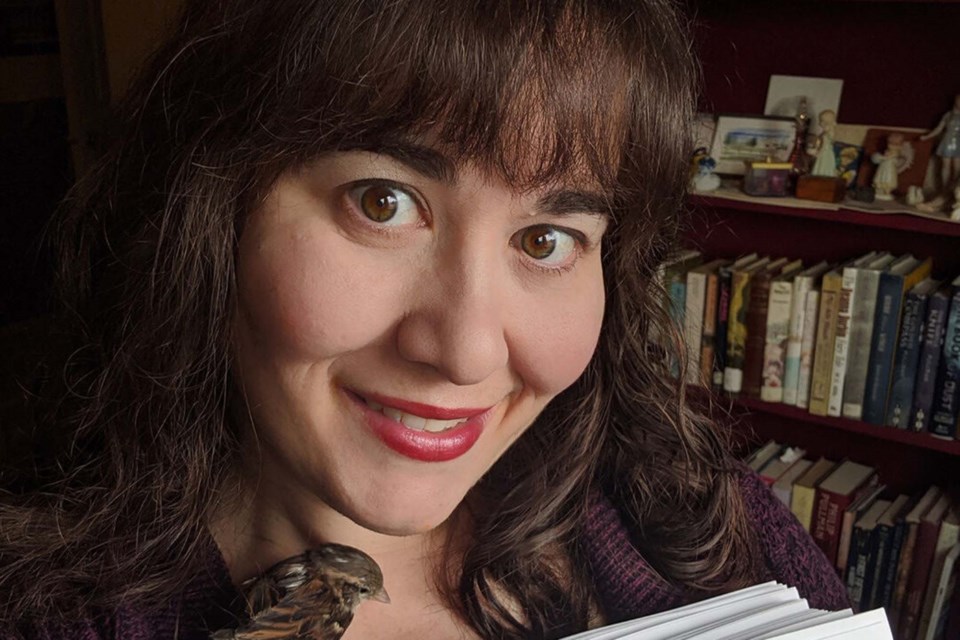DETAILS
Deanna Durbin, Judy Garland, and the Golden Age of Hollywood
By Melanie Gall
$38.56 hardcover
288 pages
Lyons Press
Available on Aug. 1. Pre-order by visiting amazon.ca
There was the Golden Age of Hollywood, a time when silent movies were becoming talkies, and actors could no longer hide behind their lack of stage presence. They had to have voices, and singers would make excellent candidates to be hired by the studios.
You’ve heard of Judy Garland, but where in the history books does Deanna Durbin get her due? Leave it to professional singer and music historian Melanie Gall to make that history book a pandemic project that is soon to be released. Deanna Durbin, Judy Garland, and the Golden Age of Hollywood tells the story of two friends/co-stars/rivals with two very different paths in Tinseltown.
It wasn’t simply that the St. Albert author needed something to do over these last few years.
“I had photographed all the information because I thought maybe someone should write this book at some point. I had been in New York in December of 2019 performing the show it’s sort of based on. I photographed every document from archives, basically. I did all the research; I just hadn’t read it,” she said.
“I just photographed it all, had it all on my phone, and so when I was basically trapped in St. Albert for two years, I had all this research just sitting there. I printed it all out, organized it, did more research, and wrote a book.”
The Durbin family moved from Winnipeg to California when little Deanna was two. Ever the singer, she started to gain a name as she moved into her teen years. The chanteuse was only 15 when she made her first film break in 1936. Though Garland would be the bigger name with The Wizard of Oz only a few years later, Durbin was the bigger talent, Gall says.
So why has she not achieved longer lasting notoriety? There haven’t been any biopics of Deanna Durbin starring Renee Zellweger.
It begs the question: how did Gall even know of her? Gall, who likes to make stage shows based off of people’s lives, picked up the hint along the way somehow.
“I knew of her because I performed in Winnipeg every year. She’s from Winnipeg. I’m always looking for people to do shows about. I’m sure at some point, some patron came up and said, ‘Hey, you should do a Deanna Durbin show,’” she said, though she notes she first heard of the singer/actor through a series of kids’ books she read growing up.
“I always had the thought that, hey, this would be a very marketable thing to do: do a show about Winnipeg’s only big Hollywood export of the 1930s. There were others, too. There were a few singers and Hollywood stars that came out of Winnipeg, but she was the biggest.”
Seeing her on film, Gall said, is proof enough of that claim.
“Her talent was staggering. She was luminous on the screen. Within two minutes, I’m like, I get it. I understand what the fuss was about. This wasn’t just a flash-in-the-pan star. It was very clear how talented she was and how she transformed a movie.”
Though Durbin and Garland were comparable for what the studios were trying to develop them as, the two achieved stardom differently.
Durbin had some setbacks early in her career, but she was basically plucked from obscurity and made a star. That was her arc, Gall said. She was first hired by MGM, but they fired her “by accident,” which they never got over. She was hired again by Universal, and she was immediately groomed to be a star.
Judy Garland, on the other hand, struggled in vaudeville from when she was a baby.
“She never quite was a success. They were the same age, more or less. She was hired by MGM a little bit earlier. They were friends then, when they were at MGM together. After Deanna was fired, Judy never heard the end of how it was a mistake and she should have been the one that went. When Deanna Durbin’s name was up in lights in her first movie, Judy Garland had a bit part in the film.”
That film was Every Sunday, released in 1936. They could have become lifelong friends, sharing their ups and downs, and maybe sharing the screen again and again. Things did not work out that way.
"Pre-Wizard of Oz ... [Garland] didn’t have a lot of big starring roles, whereas Deanna, from the first movie she was ever in, she was a star. It was impossible for them not to be rivals in a way because it was something that Judy wanted so badly. People continually told her that she wasn’t good enough. Even when she was a star, she was told what she was doing wasn’t good enough, and how physically it was wrong, and her voice wasn’t right. And everything Deanna did was praised. They were rivals. They were rivals in the press. No matter what they personally felt, they were continually being compared. Even after Judy died, even in her obituary in the New York Times, they were compared. She could never get away from this.”
For a film buff, this is a book that should have been written years ago. Gall offers a comprehensive and worldly view of these two stars and puts the Hollywood machine in a new perspective.




